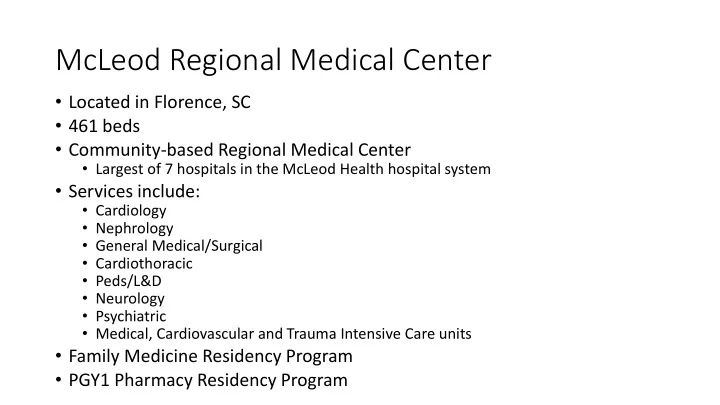

McLeod Regional Medical Center • Located in Florence, SC • 461 beds • Community-based Regional Medical Center • Largest of 7 hospitals in the McLeod Health hospital system • Services include: • Cardiology • Nephrology • General Medical/Surgical • Cardiothoracic • Peds/L&D • Neurology • Psychiatric • Medical, Cardiovascular and Trauma Intensive Care units • Family Medicine Residency Program • PGY1 Pharmacy Residency Program
Road to Med Rec Improvement • Multiple pilot programs involving both pharmacists and pharmacy technicians over the last several years • Most recently in October 2015 • Granted approval in April 2016 for a Pharmacy-based medication history program using pharmacy technicians based primarily out of the ED • Go Live in September 2016 • Shortly before that we applied and were accepted into the Marquis2 study
Data Collection • Ongoing data collection is a requirement for the approval and continuation of the Medication History Technician (MHT) Program • Monthly audits of home medication lists of 5 patients per each Medication History Technician (MHT) • Original data included • Home medication list accuracy • Average time to complete a medication history interview • Time completed relative to time of admission • Average number of sources used per patient • Average number of meds per patient • Number of discrepancies found/resolved • No plan initially to perform admission and discharge comparisons until we were accepted into Marquis2
Data Collection • Most significant barrier was the lack of time and personnel to obtain “Gold Standard” (GS) medication lists • MHT average time 27 minutes per patient • MHT training was developed using Marquis materials, but we do not utilize them to obtain GS lists • Compare discrepancies between MHT and RN obtained PAMLs • 2 pharmacists and 2 pharmacy residents underwent initial training • Each resident responsible for obtaining 2-3 GS medication lists per week – built in as requirements during their residency year • The remaining of the GS obtained by one of the other study pharmacists • At the start of the new PGY1 year, 2 new residents were trained and continue to be responsible for the bulk of the GS data collection each month
Time Burden • GS medication list: 20-25 minutes • Comparisons: 10-15 minutes • Data Entry: 5-10 minutes • Total time: 35-50 minutes per patient • It gets quicker and easier the more you do it – especially the comparisons!
Comparisons • Get to know your EMR • Know how to sort and filter the orders you’re looking through • Match the time of admission with corresponding progress notes, vitals, ancillary orders, labs, etc • Helps determine if a discrepancy was INTENTIONAL or UNINTENTIONAL • Example: Home glyburide not continued on admission, however you notice a blood glucose of 43. Even though it may not be explicitly addressed in a progress note, this is an INTENTIONAL discrepancy • Professional judgement • If speaking to the physician is not possible, rely on your clinical knowledge • Did the physician order Lexapro 20 mg intentionally, even though the patient was taking 10 mg at home, or was this a reconciliation error? What else is going on with the patient?
Challenges and Solutions • Identifying and locating patients • Identify several patients at one time – if one not available, move on to the next • Use an admission or similar report to identify patients to include in your sample • Assign patients geographically depending on where the pharmacist or resident is based to eliminate travel time • Time crunch • Obtain the GS list first – comparisons can be done later when there is more time, even AFTER the patient is discharged • Eliminates ethical dilemma and allows data to reflect the true current state • Know when to stop collecting sources • If the patient is knowledgeable, and information provided matches one or more readily available sources – STOP!
Quality Improvement • Use the data you collect to identify problems and develop solutions • Standardize work • Too many ways to conduct patient interviews leads to inconsistent results • Medication History Interview Tool • Developed in response to observed increase in PAML omissions • Identify ways to disseminate useful information for all personnel involved in obtaining PAMLs • Nursing newsletters • Annual training • Health safety fairs
Recommend
More recommend